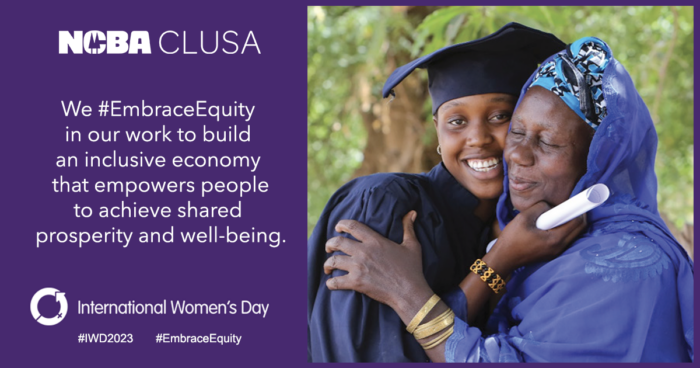 Every year during March, the U.S. and the broader global community come together to celebrate the achievements of women. Tomorrow, March 8, marks International Women’s Day. And in the U.S., the entire month of March is a time to reflect on the legacy of trailblazing American women who have fought injustice, shattered barriers and broadened opportunities.
Every year during March, the U.S. and the broader global community come together to celebrate the achievements of women. Tomorrow, March 8, marks International Women’s Day. And in the U.S., the entire month of March is a time to reflect on the legacy of trailblazing American women who have fought injustice, shattered barriers and broadened opportunities.
This year’s #EmbraceEquity campaign for International Women’s Day is designed to start a global conversation about why “equality” and “equity” are not interchangeable. “People start from different places, so true inclusion and belonging require equitable action,” campaign organizers said. Learn more about the difference between equality and equity here.
At NCBA CLUSA, we believe that promoting gender equity is essential to building prosperous households, communities, businesses and cooperatives. We #EmbraceEquity in our work to build an inclusive economy that empowers people to achieve shared prosperity and well-being.
To kick off this issue of Co-op Weekly, we’re highlighting examples of how some of our global projects are implementing inclusive programming. Later this month, we’ll uplift some of the women behind our work in the field on social media. Then on Thursday, March 30, we’ll wrap up the month of March with a webinar highlighting NCBA CLUSA’s gender equity work.
GLOBAL | CREATING AN ENVIRONMENT FOR COOPERATIVE EXPANSION (CECE)
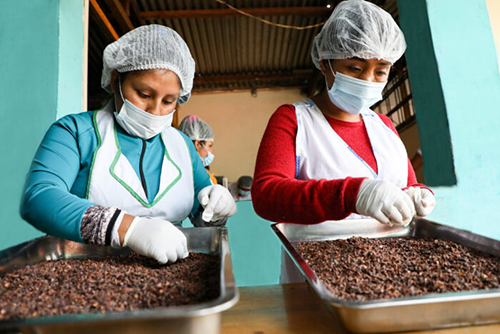
Through the Creating an Environment for Cooperative Expansion (CECE) project, funded by the US Agency for International Development (USAID) Cooperative Development Program (CDP), NCBA CLUSA promotes women’s inclusion, empowerment, and leadership in cooperatives in many ways. In Kenya, the CDP team helped several dairy cooperatives amend their bylaws to reduce barriers for women’s inclusion and leadership opportunities. Coupled with the ongoing women’s cooperative membership campaigns in Meru and Nandi Counties, over 700 women have joined local cooperatives and 23 women have been elected to leadership positions across 8 dairy cooperatives. CDP partner Capital SACCO continues to grow their financial literacy and lending program for women, which now includes over 445 women participants.
In Madagascar, coaching activities with cooperatives have focused on women’s mentorship. Women coaches from ONI worker cooperative are helping women in agricultural cooperatives develop leadership skills and confidence in themselves. As one cooperative member expressed, “Personally, I feel more comfortable listening to other women. The messages are clearer, and I have the courage to ask questions because the coach is someone like me.”
In Tanzania, local partner Rural Urban Development Initiatives (RUDI) implements coaching activities with 29 SACCOs and agricultural cooperatives, including two women-only cooperatives who are changing their communities’ traditional mindsets about women’s roles and capabilities. As one husband explained, “I did not like my wife leaving the house to go to the cooperative, but I ended up accepting.” As time went on and he saw the financial contributions his wife was making to their household because of her involvement in Kalali Women’s Dairy Cooperative, his perspective changed. His wife said proudly, “he helps me with the chores so that I don’t arrive late at the cooperative.”
In Peru, one unique activity highlighted recently is the CDP’s support for Dulce Esperanza, a group of incarcerated women who want to grow their chocolate business and become a cooperative. And, in Peru and Guatemala, the Coop Business School (CBS) continues to serve as an avenue for increasing women’s participation in cooperatives through courses in digital marketing, branding, and social media communications.
Read on to learn how NCBA CLUSA is supporting a group of incarcerated women at the Women’s Penitentiary in Quillabamba to form a cooperative.
MADAGASCAR | USAID SUSTAINABLE VANILLA FOR PEOPLE AND NATURE (SVPN) ACTIVITY
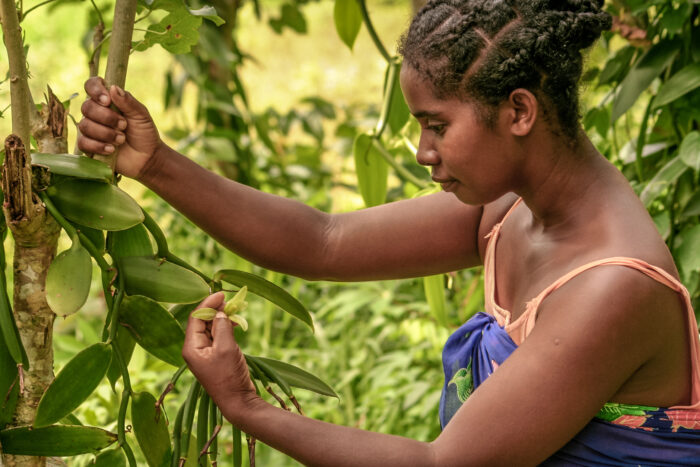
In Madagascar, NCBA CLUSA has used the cooperative principles to guide our work on the USAID Sustainable Vanilla for People and Nature (SVPN) Activity, locally known as Mafatoky. Mafatoky’s goals are to create sustainable certified vanilla production that is environmentally friendly. While the project is focused on creating partnerships with vanilla producers and local commercial partners to sell vanilla in the international market, Mafatoky simultaneously promotes women’s participation and leadership in cooperatives, and adapts project interventions to their specific needs. For example, Mafatoky trained women on poultry raising, providing them with an additional income-generating activity outside of the vanilla cooperatives. This ensures that women, regardless of the time of year, earn income to improve their own access to nutritious foods. In FY22, 1,700 chicks were distributed to trained cooperative members who were actively raising chickens and built improved chicken coops, ultimately increasing the availability of poultry more broadly in the community.
Read on to learn about how Mafatoky is utilizing local reforestation projects to help tackle both deforestation and climate change.
U.S. | USDA STRENGTHENING CO-OP CAPACITY FOR HISTORICALLY UNDERSERVED FARMERS PROJECT
 NCBA CLUSA is proud to highlight the women in cooperatives who are leading their organizations and working with us to strengthen the cooperative ecosystem. The number of women farm operators has grown significantly in the last few decades. As reported by the Census of Agriculture, 56% of all farming operations have at least one female decision maker and they are farming millions of acres. As NCBA CLUSA works to strengthen our cooperative ecosystem, explore the women-led cooperatives we work with through our USDA-funded Strengthening Co-op Capacity for Historically Underserved Farmers Project:
NCBA CLUSA is proud to highlight the women in cooperatives who are leading their organizations and working with us to strengthen the cooperative ecosystem. The number of women farm operators has grown significantly in the last few decades. As reported by the Census of Agriculture, 56% of all farming operations have at least one female decision maker and they are farming millions of acres. As NCBA CLUSA works to strengthen our cooperative ecosystem, explore the women-led cooperatives we work with through our USDA-funded Strengthening Co-op Capacity for Historically Underserved Farmers Project:
- Agroecology Commons
- California Center for Cooperative Development
- Cooperative Development Institute
- Co-op Cincy
- UW Center for Cooperatives
- Montana Cooperative Development Center
- Keystone Development Center
- Indiana Cooperative Development Center
- Ourspace
- CooperationWorks!
Click here to learn more about the project, access resources, and connect with us. Together, we can build resilience and equity into American agriculture.
GLOBAL | USAID FARMER-TO-FARMER
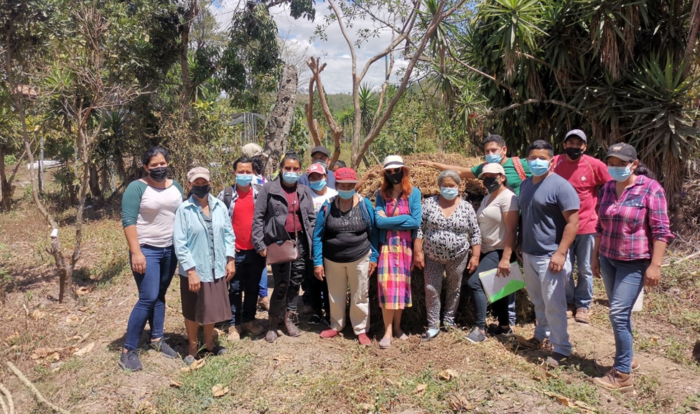 NCBA CLUSA’s USAID-funded Farmer-to-Farmer program volunteers work with farmers, producer groups, rural businesses and service providers to develop the local capacity necessary to enhance food security, increase incomes, spur economic growth and address environmental and natural resource management challenges. NCBA CLUSA’s Farmer-to-Farmer work falls under our Strengthening Cooperatives and Producer Organizations practice area, which is dedicated to developing strong, inclusive cooperatives and producer groups that support equal participation, leadership and agency among all women, men and youth. Projects in this area support women’s entry and leadership in their local economies through cooperative development—promoting, strengthening and helping grow cooperative businesses.
NCBA CLUSA’s USAID-funded Farmer-to-Farmer program volunteers work with farmers, producer groups, rural businesses and service providers to develop the local capacity necessary to enhance food security, increase incomes, spur economic growth and address environmental and natural resource management challenges. NCBA CLUSA’s Farmer-to-Farmer work falls under our Strengthening Cooperatives and Producer Organizations practice area, which is dedicated to developing strong, inclusive cooperatives and producer groups that support equal participation, leadership and agency among all women, men and youth. Projects in this area support women’s entry and leadership in their local economies through cooperative development—promoting, strengthening and helping grow cooperative businesses.
Read on to learn how NCBA CLUSA’s USAID-funded Farmer-to-Farmer Program supported Asociación de Productoras Libres de Marcala (APROLMA) in Honduras in becoming a women-led coffee association.
SENEGAL | USAID FEED THE FUTURE KAWOLOR
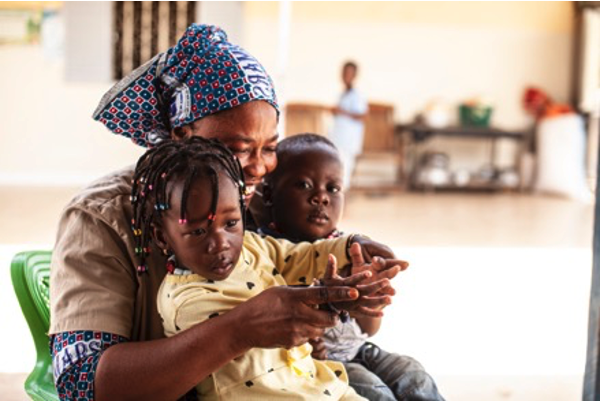 NCBA CLUSA’s USAID-funded Feed the Future Kawolor project closed in Senegal in late 2022 and worked to improve nutrition for children and mothers through a systems approach to the availability, education and sustainability of nutritious foods. Kawolor utilized debbo galle, or mothers’ groups, as a platform to introduce mothers, women of reproductive age and fathers to nutrition education, horticulture activities, savings for investment, income-generating activities and household decision-making. By addressing the needs of the entire household, Kawolor implemented sustainable skills and resources, ensuring that these approaches lead to the adoption of better feeding and food preparation and, ultimately, better nutritional outcomes for children. The project contributed to the Senegalese Government’s strategy to curb malnutrition, food insecurity and poverty.
NCBA CLUSA’s USAID-funded Feed the Future Kawolor project closed in Senegal in late 2022 and worked to improve nutrition for children and mothers through a systems approach to the availability, education and sustainability of nutritious foods. Kawolor utilized debbo galle, or mothers’ groups, as a platform to introduce mothers, women of reproductive age and fathers to nutrition education, horticulture activities, savings for investment, income-generating activities and household decision-making. By addressing the needs of the entire household, Kawolor implemented sustainable skills and resources, ensuring that these approaches lead to the adoption of better feeding and food preparation and, ultimately, better nutritional outcomes for children. The project contributed to the Senegalese Government’s strategy to curb malnutrition, food insecurity and poverty.
Learn more about our global programs Explore our approach to inclusive development


